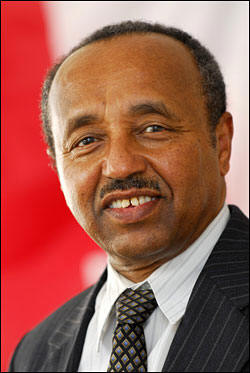SUBSCRIBE TO BIG MED AT THE BIG MED SITE ON GOOGLE GROUPS.



November 10, 2009
| AMERICAS | OCEANIA | EUROPE | MIDDLE EAST | ASIA | POLITICS | BUSINESS | RESEARCH | EDUCATION | WORKFORCE |
Big Medicine is published by Team EMS Inc.
Managing Editor
Contact: ideas@tems.ca
Views
Contributor Emeritus
Tools
Stop Violence Against Women & Girls
The views expressed here reflect the views of the authors alone, and do not necessarily reflect the views of any of their organizations. In particular, the views expressed here do not necessarily reflect those of Big Medicine, nor any member of Team EMS Inc.
VIEWS: BEKELE GELETA
Climate change: the ultimate early
warning
To many people enduring its effects worldwide, the
global economic crisis must have felt like what we, in the humanitarian
sphere, call a “sudden-onset” disaster. One day, it seemed, they had jobs
and houses and futures; the next they didn’t.
Yet in many countries there are economists who claim, quite possibly with
justification, to have seen the dangers on the horizon well in advance:
unsustainable property bubbles; dubious and incomprehensible banking
practices centred on “securitization”; too much borrowing; and so on.
We think we see signs of trouble ahead too, in the form of what our latest
annual World Disasters Report calls the “ultimate early warning”: climate
change.
The report points to the vast amount of evidence now uniting experts the
world over that suggests a highly changeable climate in the decades
immediately ahead. Scientists, ominously, now predict not just “imaginable”
surprises but “true” surprises as well. “Unknown unknowns”.
There are, of course, uncertainties attached to these predictions. But it is
now highly likely that extreme-weather events – floods, droughts and storms
– will become more frequent and more severe. And we cannot say we have not
been warned. In March, experts meeting in Copenhagen said global sea levels
could rise by more than a metre by the end of the century because of changes
in the polar ice sheets; existing UN estimates, they believe, are too low.
The disasters which climate change will trigger, potentially threaten more
lives and livelihoods than any before. But are we acting on this “early
warning”? So far, only piecemeal. Some countries and communities are well on
the way to protecting themselves; others, usually vulnerable nations in the
developing world, lack the means to act.
Weather-related disasters
Seismic disasters, for sure, are devastating when they occur. This December
will see the psychologically important fifth anniversary of the Indian Ocean
tsunami – probably the worst natural disaster of its kind in recorded
history.
Our report highlights that, after 2004, last year was the second deadliest
of the preceding decade, due to just two disasters: Cyclone Nargis, which
left nearly 140,000 people dead (or missing, presumed dead) in Myanmar, and
the earthquake which killed nearly 88,000 in the Chinese province of Sichuan
– together making up 93 per cent of the global disaster toll.
It is difficult to draw any firm conclusions from either of those events,
except perhaps about the political limits of humanitarianism.
Audible, however, in the background to our report, written not by us but by
independent specialist experts, is the steady drum beat of climate warning –
still thankfully classifiable as “early” warning. And still capable – if not
for very much longer – of being coupled with “early” action.
Indeed, the subtitle of World Disasters Report this year is: “Focus on Early
Warning, Early Action”.
The International Federation’s Disaster Relief Emergency Fund (DREF) has
grown by nearly 300 per cent in the last half decade, and last year amply
confirmed the rise in small-scale, weather-related disasters climate
scientists are warning of. Floods, storms, heatwaves and droughts, together
accounted for nearly 60 per cent of grants from DREF, now worth more than
US$ 15 million a year.
In fact, so stark is this trend that we in the Red Cross Red Crescent, who
must try to pick up the pieces after disasters strike, feel we can no longer
sit around and wait just to respond to them – increasingly we must try to
predict them and reduce their impact.
In less than a decade, the number of Mozambicans who die in floods
and storms has been reduced almost to zero
In July, the IFRC launched its first wholly preemptive appeal (for nearly
US$ 750,000) for flood preparedness, based on seasonal forecasts for the
West African monsoon, that were to prove highly accurate. While there was no
big emergency in any one country, as in 2007, disaster managers were much
better placed to deal with the widespread smaller emergencies that did occur
– especially in Benin and Togo.
In Haiti, although the human toll from the Caribbean hurricanes – Fay,
Gustav, Hanna and Ike that battered the country in 2008 - was considerable,
it would have been higher still but for “early warning, early action”. Red
Cross volunteers, mostly forewarned, worked round the clock before and after
the storms hit, carrying out evacuations, search and rescue, first aid and
relief. They plotted and re-plotted landfall scenarios for the hurricanes to
decide how best to use very scarce resources to save lives.
This year and next, the International Federation will encourage a greater
use of DREF for preparedness, and together with scientific
partner-organizations we will try to provide our member societies with early
warning of unexpected events or abnormal trends.
Which brings us back to where we started. In the new climate of austerity in
the world today, we must all demonstrate value for money in the goods and
services we provide – both in the private and public sector. And quite right
too.
Humanitarian “impact”
It is impossible to be exact. But one academic study found that public money
buys four times as much humanitarian “impact” if spent on preparation and
protection before disaster strikes than on relatively expensive response.
It can be done. And the case study put forward by many disaster experts is
still Mozambique – one of the best examples anywhere in the world of what we
call “community-based disaster preparedness”. In less than a decade, the
number of people who die in the floods and storms it is regularly exposed to
has been reduced almost to zero, through carefully planned and rehearsed
evacuation procedures as well as better use of climate information.
If the scientists are right, it would be natural for the Red Cross Red
Crescent and other agencies that respond to disaster to be the first to
notice things changing. (We do, by the way.)
And surely it’s no coincidence that the World Climate Change Conference in
Poznan in December was the first of its kind to address the issue of
adaptation to the inevitable humanitarian impacts of climate change; and the
first where the humanitarian community was strongly represented.

Bekele Geleta
is secretary general of the Geneva-based International Federation of Red
Cross and Red Crescent Societies, the world’s leading disaster-response
agency.
![]()
The contents of this site, unless otherwise specified, are copyrighted by © Big Medicine 2001-2009. The news provided is for personal use only. Reproduction or redistribution of the this site, in whole, part or in any form, requires the express permission of Big Medicine or the original source. For questions or comments pertaining to this site, contact the web administrator. Big Medicine is not responsible for the content of external sites linked and does not endorse their content. Advertisers are not responsible for Big Medicine contents, the content of external sites linked and do not endorse their content.